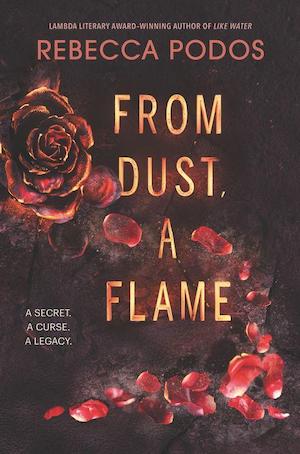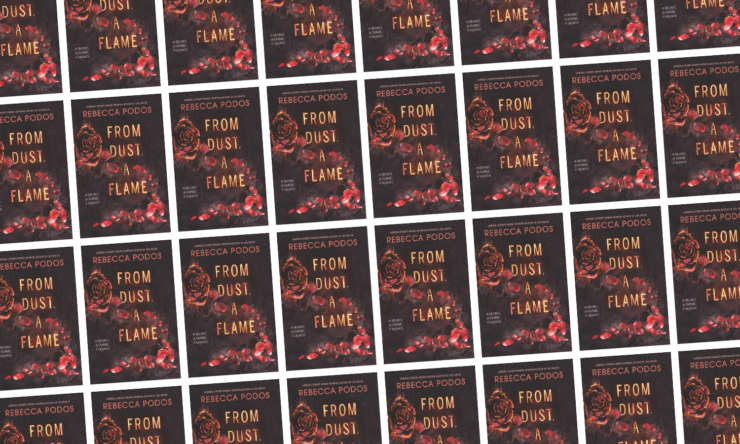Rebecca Podos’ From Dust, A Flame is a lyric, deeply moving contemporary fantasy YA that digs into complicated relationships with Judaism, queerness, and becoming.
Hannah Williams has never known her roots. Her father died when she was small, leaving behind a set of nice, distant grandparents in Canada, and her mother never talks about her family or where she came from at all. Instead, she moves Hannah and her brother Gabe across the country time and time again, never quite settling. Everything changes the day of Hannah’s seventeenth birthday, when she wakes up with a set of eyes she doesn’t recognize peering back at her in the mirror. This is only the beginning of a series of frightening mutations that sends their mother searching for answers. When she doesn’t return, Hannah and Gabe have to take the situation into their own hands—and those of the stranger who sends them an invitation to sit shiva for the grandmother they never knew they had. In Fox Hollow, they find an entire community and history kept secret from them, brimming at once with beauty and impossible ache.
From Dust, A Flame wends back and forth through time, highlighting the parallels between Hannah’s coming-of-age, her burgeoning first love, her complicated emerging relationship with Judaism, with those of her mother, and her mother’s mother. It’s such a successful dual narrative—or rather, a single narrative of mothers and daughters, each story braiding and fraying and braiding into the next—that functions as a literalization of the core of the book: the ways the past lives on, which can be both a curse and a marvel. This is a poignant, propulsive story that feels at once both wholly original and deeply rooted in Jewish folklore and history.
Buy the Book


From Dust, A Flame
I know what it is to have a complicated relationship with Judaism, to have it inextricable from grief and the many intimate manifestations of generational trauma. Many of us do. Rebecca Podos weaves a tender, beautifully nuanced evocation of faith. From Dust, A Flame makes room for the exploration of Judaism as someone who comes to understand their connection to it a bit later in life. Podos celebrates Judaism as a shared history, each character with a different relationship to the faith and culture. Not every identity is a fixed thing, and as Hannah discovers parts of herself she’s never known, she begins to find her way closer to the sense of belonging she’s been looking for for a very long time.
Hannah also comes to consider identity through her sexuality within the story; she’d assumed she was straight until she met Ari Leydon. In fact, all the protagonists as well as several secondary characters are queer. They’re all at different stages and have different experiences with queerness. The book ends without Hannah landing on a label, though her perception of her own sexuality organically evolves, which I love. Meanwhile Gabe has been confident in his sexuality, and his focus is on where he fits into a Jewish family as someone who’s adopted. I’m not adopted myself, but to me it does feel like Podos writes him and his relationship to his family with as much compassion as the other elements of the story.
While the siblings work through the complexities of a heavy, hidden history, Hannah’s also emerging on a tender, burgeoning queer romance. Podos strikes a beautiful, deliberate balance between the burden of the secret curse and the sweet trust of first love. That’s so much at the heart of this book. At one point, Hannah asks, as she knows her mother has had to ask long ago: “what’s the point of love when, whether slowly and painfully or suddenly and tragically, eventually, everyone loses everyone?” It’s a brutal question, and it hits all the harder after the years of unimaginable loss we’ve been surviving. Podos gently guides Hannah and the reader to the only answer: because we can’t give up. Because everything terrible will change us, and terrible things will never not happen, but beautiful things will too, and if we keep going, we will meet them. Because there’s cruelty in this world, selfishness and tragedy, but there’s also kindness, and belonging, and people in this world who will love us so well and so right, and we haven’t met all of them yet.
I love how this novel allows its parents to be messy too, how Hannah, Gabe, and Ari get to know their parents as people. As messy teenagers, once. This is a story about mothers and daughters, about extended communities of faith, about family. About finding resonances of yourself and your future in your family and your history. It’s also about reckoning with everyone’s mistakes, recognizing that seemingly unforgivable decisions can be borne out of love, trauma, and even true choicelessness—but that doesn’t mean it can’t still be irrevocably damaging.
It’s not an unfamiliar premise, finding yourself in the unexpected mysteries of a family secret. But that’s part of the beauty of it—I’ve hardly seen it explored quite like this, openly Jewish and unapologetically queer, letting the complexity of each facet of identity shine, and written with such deliberate compassion.
From Dust, A Flame is deftly crafted work that packs a deeply thoughtful, heavier storyline into a thrilling fantastical mystery. It successfully blends fantasy and contemporary into a taut plot. Intriguing and powerful, this is an ambitious, innovative story, and the payoff is so cathartic. Intertwining Jewish folklore in a community setting and history set in pre-WWII Prague, Podos cleanly evokes the dualities at the core of her characters. The simultaneity of wanting to belong but wanting to explore, joy and pain both passed through a family—all while centering queer kids figuring out how to care for each other and save the day.
From Dust, A Flame is published by Balzer + Bray.
Maya Gittelman is a queer Fil-Am and Jewish writer and poet. They have a short story forthcoming in the YA anthology Night of the Living Queers (Wednesday Books, 2023). She works in independent publishing, and is currently at work on a novel. Find them on Twitter (@mayagittelman) or Instagram (@bookshelfbymaya).










